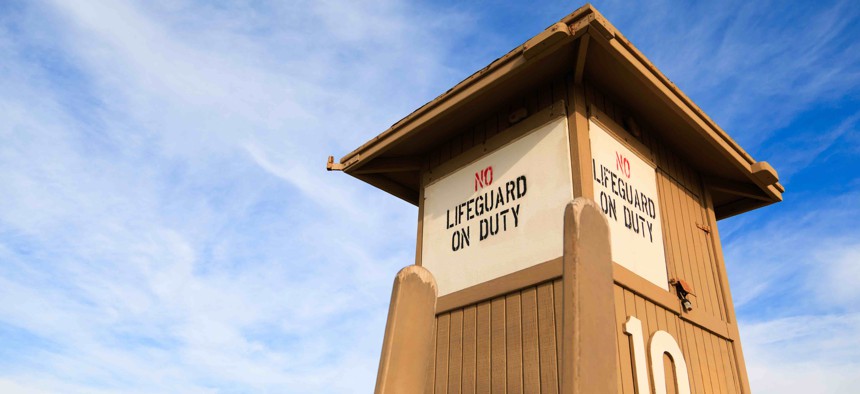Seasonal Worker Shortage Threatens Closure of Public Pools and Parks

Paul Velgos/Getty Images
State and local governments are scrambling to fill summer parks and recreation positions, raising wages up to $16 per hour to compete with private businesses.
Facing acute labor shortages, some state and municipal parks and pools are significantly raising pay rates to attract summer workers, but officials aren't sure that will be enough to fill enough jobs, which could force some facilities to close or not open at all.
Sioux Falls, South Dakota hiked the hourly rate for lifeguards at city pools to $16 from $10.50 last year. Indianapolis is raising the starting wage for lifeguards to $15 an hour, a $2 increase over last summer.
And last week, the Michigan Department of Natural Resources announced that it will pay seasonal employees $15 an hour, significantly more than the state’s $9.87 minimum wage.
Ron Olson, chief of parks and recreation for the Michigan Department of Natural Resources, said he hopes the pay bump will help fill more than 1,300 summer positions in state parks, forest campgrounds and marinas. The department is facing competition for workers from private businesses, many of whom also are offering higher wages this summer.
“We believe [the pay hike] will have some impact but it’s not clear yet how much because there are a lot of other entities that have also raised their pay rates,’’ Olson said. “We needed to change the way we do things.”
State and local governments are scrambling to fill summer park and recreation positions. In some communities, the worker shortage has led to the closing of public pools or a reduction in camp offerings.
Several state parks in Nebraska are cutting their hours due to the worker shortage.
“As Nebraska’s state parks prepare for another summer season, some are adjusting their activity hours because of a limited workforce,’’ the Nebraska Game and Parks Twitter account advised on Tuesday. Officials urged members of the public to call before venturing out to ensure a park or program is open.
The department typically hires about 900 workers to work as lifeguards and housekeepers and staff concession stands and shooting ranges. So far this year, it has only hired about half the staff needed to run its programs, according to an article in Nebraskaland, a publication produced by the Game and Parks Department.
Where Are the Workers?
High school and college students, along with retirees, make up the bulk of the seasonal workforce at city and state parks nationwide.
According to the U.S. Bureau of Labor Statistics, the sector is the third biggest employer of 16-to-19-year-old seasonal workers, with only the food service industry and retail employing more teenagers.
Yet a 2019 report by the Brookings Institution found teen participation in the workforce was declining due to increased school enrollment and more competition from older workers and immigrants, among other factors.
In Michigan, the worker shortage predated the pandemic: Olson said the department began struggling to fill summer positions in 2018. But the Covid-19 crisis exacerbated the worker shortage because fewer retirees opted to seek summer employment, in addition to the ongoing reduction in teen employees.
In 2021, Michigan raised the pay rate for summertime workers to $10.20 an hour, but it wasn’t enough. After this year’s increase to $15, workers who return for a third summer could see their pay rise to $16 an hour, pending budget approval.
The department will also begin relying on private contractors to clean park bathrooms and other facilities instead of trying to hire seasonal staff to do the work.
The labor shortage in Michigan is especially critical in remote regions that are far from the state’s population base, Olson said. To attract candidates, the department has launched a pilot program to provide housing for seasonal workers. It is converting caretakers’ cottages at a state park to provide a place for workers outside of the area to live.
“We’re trying to find creative ways to deal with this,’’ Olson said.
Daniela Altimari is a reporter for Route Fifty based in West Hartford, Connecticut.
NEXT STORY: Biden’s Executive Order on Policing Could Help Spur Local Reforms





